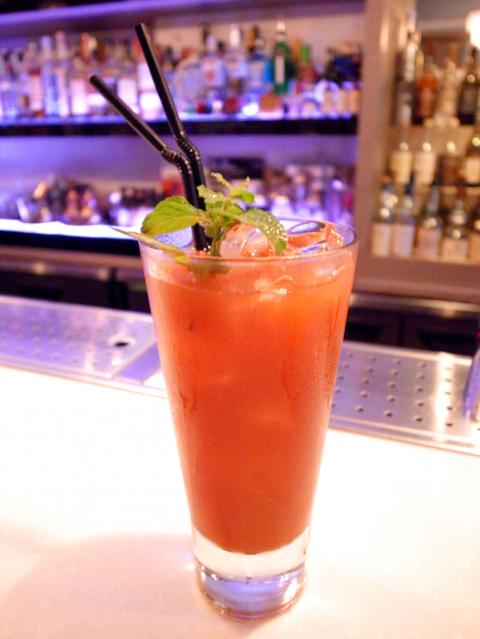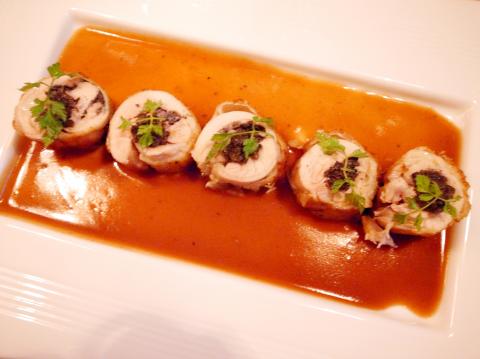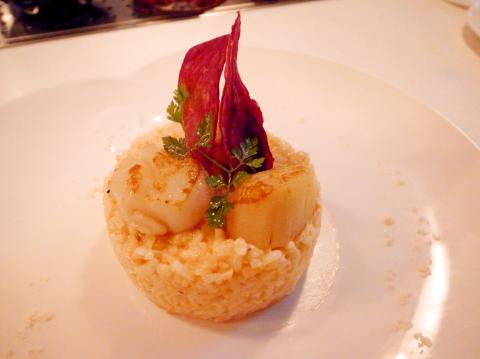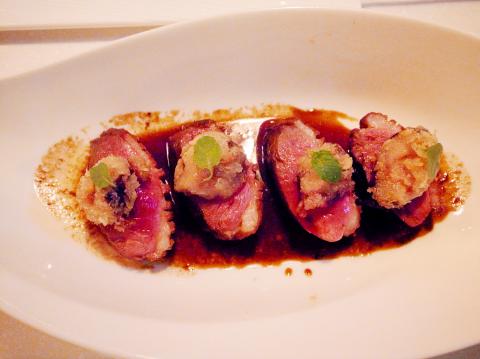Co-founded by Aki Wang (王偉勳), a three-time world champion mixologist, Indulge Experimental Bistro is all about the drink. Bartenders dressed in black concoct a fine collection of craft cocktails under atmospheric purple lighting, luring imbibers with a focus on creativity and bartending prowess. Food is also served here, but pales before Wang’s much lauded creations.
Tucked away in an alley near the Zhongxiao Fuxing MRT Station (忠孝復興捷運站), the bistro has a dark, intimate feel, outfitted with a basement area designed to accommodate large groups. The design concept, however, doesn’t appear well-thought-through. Predominantly white and beige, the interior color schemes give the space a homey, rather tame look, failing to accentuate the sense of excitement exuded from the back bar where arrays of bottles promise a Dionysian night.
The bistro’s cocktail menu is a completely different matter, featuring Wang’s original concoctions as well as classics with a touch of innovation and local zest. Guava Mule (NT$300), for example, is a sweet, fruity interpretation of Moscow Mule, created using vodka, guava puree, lime juice and ginger beer made in-house. The Blood of Don (NT$500) I tried packs a well-balanced zing, blending two Don Julio Tequila varieties with a house-made specialty infusion composed of Sichuan pepper, celery bitters, sea salt, Worcestershire sauce, lime and tomato juice.

Photo: Ho Yi, Taipei Times
The bartenders at Indulge are also known for their experiments with unique flavors. Among the original blends on offer, the signature Scent of Woman (NT$400) is a vodka-based cocktail infused with sauvignon blanc wine, lemon and apple juice as well as the house-made ginger lily syrup. Fragrance (NT$400) is also a feminine drink made with gin, grape and litchi liquors and a lemon and apple twist.
For those looking to splurge, the world-class mixologist and proprietor has generated a small selection of cocktails using premium aged spirits. The 1968 Arzerac (NT$2,000) is their most expensive drink, featuring 1968 vintage Armagnac, a kind of brandy produced in the Armagnac region of France, and infused with absinthe, aromatic bitters as well as orange and lemon zest.
As for the food, the bistro has a decent selection of appetizers, main courses and late-night snacks available after 10pm, and the young chefs evidently draw inspiration from local ingredients to create European-influenced dishes. The end result is, however, hit-and-miss.

Photo: Ho Yi, Taipei Times
The grilled duck breast and fried figs seasoned with sherry wine (NT$450), for example, was a playful explosion of flavors but let down by the overly dry meat. The steamed truffle chicken rolls with merlot sauce (NT$380) were an adequate choice of appetizer spiced up with the rich flavor of black truffle.
For the main course, my dining partner and I shared the boiled cod roes risotto with sauteed scallop (NT$500). Using the oceanic delicacy from Donggang (東港), Pingtung County, the dish had a freshly saline taste but didn’t impress. For an extra NT$300, a main course can be made into a set meal with bread, appetizer, soup and dessert. And some of the cocktails are half off if a main course is ordered.
It is generally agreed among food bloggers that the bistro’s appetizers and snacks are safer choices than main courses. Late-night tidbits include roasted spicy chicken wings seasoned with cognac and fennel (NT$280), smoked salmon with caviar and spicy passion fruit sauce (NT$350) and fried seasonal seafood with sea urchin cheese sauce (NT$380).

Photo: Ho Yi, Taipei Times
Making reservations on weekends is recommended. My dining partner and I dropped by on a rainy Sunday night, and were lucky to have the last two seats at the bar. We were also told that the bistro’s food and cocktail menus change seasonally, and new offerings are expected to become available at the beginning of next month.

Photo: Ho Yi, Taipei Times

Photo: Ho Yi, Taipei Times

In the next few months tough decisions will need to be made by the Taiwan People’s Party (TPP) and their pan-blue allies in the Chinese Nationalist Party (KMT). It will reveal just how real their alliance is with actual power at stake. Party founder Ko Wen-je (柯文哲) faced these tough questions, which we explored in part one of this series, “Ko Wen-je, the KMT’s prickly ally,” (Aug. 16, page 12). Ko was open to cooperation, but on his terms. He openly fretted about being “swallowed up” by the KMT, and was keenly aware of the experience of the People’s First Party

Aug. 25 to Aug. 31 Although Mr. Lin (林) had been married to his Japanese wife for a decade, their union was never legally recognized — and even their daughter was officially deemed illegitimate. During the first half of Japanese rule in Taiwan, only marriages between Japanese men and Taiwanese women were valid, unless the Taiwanese husband formally joined a Japanese household. In 1920, Lin took his frustrations directly to the Ministry of Home Affairs: “Since Japan took possession of Taiwan, we have obeyed the government’s directives and committed ourselves to breaking old Qing-era customs. Yet ... our marriages remain unrecognized,

During the Metal Ages, prior to the arrival of the Dutch and Chinese, a great shift took place in indigenous material culture. Glass and agate beads, introduced after 400BC, completely replaced Taiwanese nephrite (jade) as the ornamental materials of choice, anthropologist Liu Jiun-Yu (劉俊昱) of the University of Washington wrote in a 2023 article. He added of the island’s modern indigenous peoples: “They are the descendants of prehistoric Formosans but have no nephrite-using cultures.” Moderns squint at that dynamic era of trade and cultural change through the mutually supporting lenses of later settler-colonialism and imperial power, which treated the indigenous as

Standing on top of a small mountain, Kim Seung-ho gazes out over an expanse of paddy fields glowing in their autumn gold, the ripening grains swaying gently in the wind. In the distance, North Korea stretches beyond the horizon. “It’s so peaceful,” says the director of the DMZ Ecology Research Institute. “Over there, it used to be an artillery range, but since they stopped firing, the nature has become so beautiful.” The land before him is the demilitarized zone, or DMZ, a strip of land that runs across the Korean peninsula, dividing North and South Korea roughly along the 38th parallel north. This